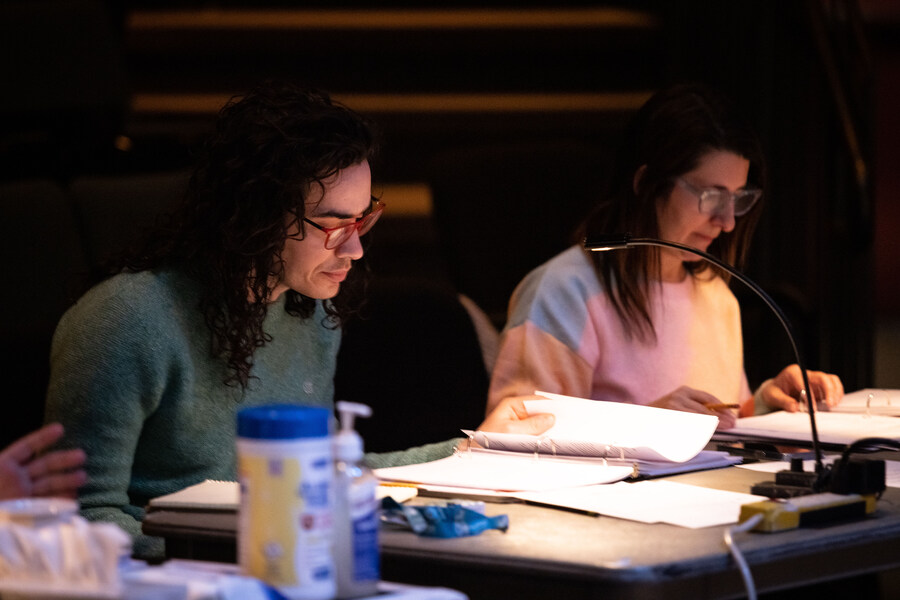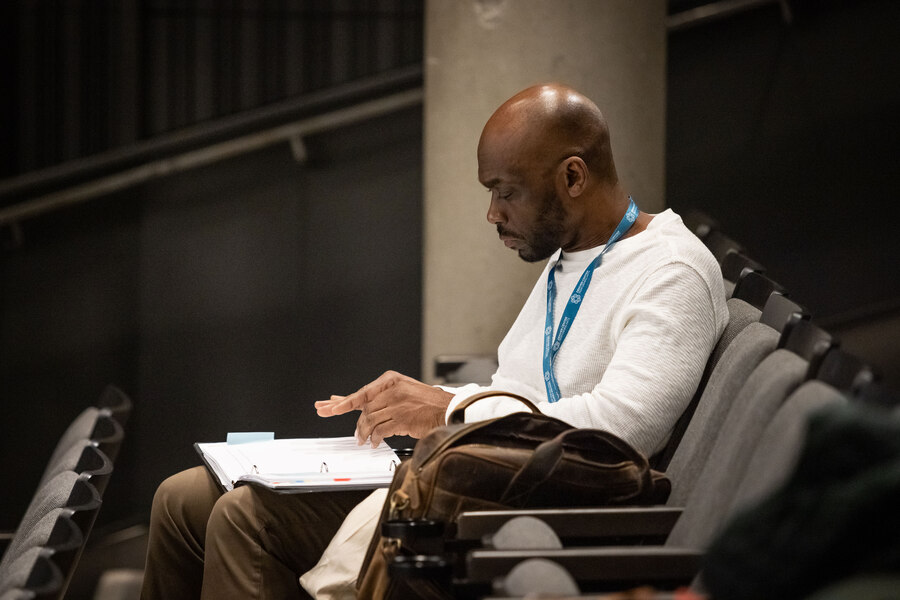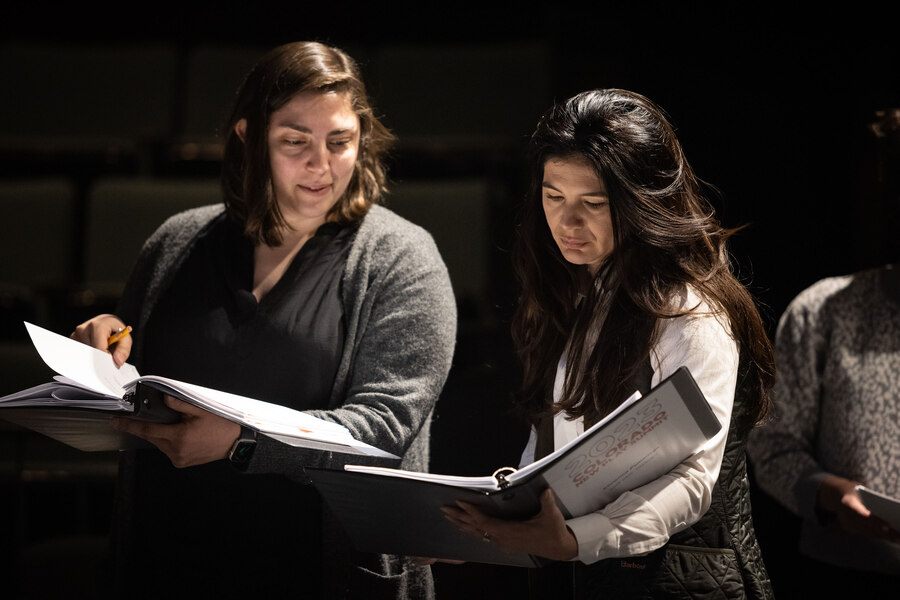Playwright Jake Brasch wanted to make it clear that he was not—not—sitting in the back row at the staged reading of the reservoir laughing at this own jokes. His charming squawks were in response to the gaffes and other insider insights he and director Shelley Butler were gleaning during the first Denver Center’s Colorado New Play Summit reading of his addiction-and-Alzheimer’s dramedy.
Brasch’s play was one of four works featured at the 17th installment of the Denver Center for the Performing Arts premiere event, which ran Feb. 25-26. The others were Vincent Terrell Durham’s ouchy-then-straight-up-heartbreaking Polar Bears, Black Boys & Prairie-Fringed Orchids; Christina Pumariega’s timely spiritual saga Joan Dark; and Sandy Rustin’s 1800s-set whodunit-and-why romp The Suffragette’s Murder.
Ongoing post-pandemic budgetary constraints pared this annual gathering down from its customary two weekends to one. In previous years, the first weekend readings pulled back the curtain on the play development process for local theatregoers, and the second weekend was a showcase for industry visitors. Denver Center Theatre Company artistic director Chris Coleman and Summit producer Grady Soapes say they hope to return to a two-weekend format and thereby give playwrights more substantial table work and rewriting time.
This year’s slimming down may prick anxieties about the dwindling of well-resourced opportunities for new-play development—anxieties that gained momentum when Actors Theatre of Louisville announced last spring it would not produce its Humana Festival of New Plays, a behemoth that in its 45 years of existence had become synonymous with the care and feeding of playwrights and their work.
Yet here we were again, packed into the two houses at the Denver Center’s Helen Bonfils Theatre Complex: theatregoers, theatremakers, and industry out-of-towners, sitting cheek by jowl before a strong slate of plays. Early audience feedback was trending positive for all the shows, according to Soapes, who said that early tallies found 94 percent of audience survey respondents saying they would recommend the Colorado New Play Summit to others. And the Summit’s four playwrights were the beneficiaries of still enviable resources: a director, a dramaturg, an ace technical crew, attuned acting talent, and time to hear and hone the work in rehearsal before learning from the audiences what landed and what didn’t.

Brasch returned to his hometown of Denver with a reservoir, which follows a character named Josh returning to his hometown of Denver from New York City, on medical leave from college due to alcoholism. (During the Summit, the playwright celebrated his own ninth anniversary of sobriety.) Josh gets it in his muddled head that his compromised memory shares similarities with the Alzheimer’s-induced decline his grandparents are facing. If that sounds a bit brainy or brain-science-y, the play was commissioned by Ensemble Studio Theatre/Alfred P. Sloan Foundation Science & Technology Project, which encourages artists to engage the issues of science and technology.
The actors who portrayed Josh’s grandparents topped a gifted ensemble. “Beyond being so talented as actors, everyone was such a generous and intelligent advocate for their character in the room,” said Brasch of his veteran cast, which included Caroline Aaron, Peter Van Wagner, and one-time Denver Center Theatre Company member Lawrence Hecht. “There was a moment during the table work where I felt like, ‘Why are these two things not working next to each other?’ We talked about it for, like, 45 minutes. To be perfectly honest, I’m not sure we found the exact thing yet. But from a dramaturgical perspective, I just felt so rigorous in what I was able to accomplish, because everybody was on my team, but also willing to be like, ‘I don’t understand this,’ ‘I don’t know where I’m going,’ ‘I don’t know how to navigate this turn.’”
The playwrights found the Denver Center’s labyrinth of spacious rehearsal rooms to be laboratories for insights, adjustments, and nuance. In Polar Bears, Black Boys and Prairie-Fringed Orchids, a cocktail party unravels in the renovated Harlem brownstone of a liberal-leaning white couple after the killing of Black 12-year-old by police. Before their guests arrive, Molly and Peter tuck their Black infant son down for the evening. Among the invited: the mother of the murdered 12-year-old.
The play is hardly a comedy, but there are prickly laughs, and calibrating the humor-to-heaviness ratio proved essential. “During one of our rehearsals, the director Jamil Jude had a very simple line change request,” Durham recounted. “At a point in the play, he wanted the character to say ‘BLM’ rather than ‘Black Lives Matter.’ You wouldn’t think such a small change would accomplish much. But as soon as the actress changed the wording, the entire room erupted in laughter. It was a perfect suggestion. That’s the magic of being in a rehearsal room with other creatives. Your play is given the opportunity to grow beyond your own voice.”

A few days before arriving in Denver, Joan Dark playwright Christina Pumariega said in an email that the summit would be the first time she’d be seeing her words performed in a theatre. Yet she’d almost forgotten that part of the ride during the rehearsal room work on her play, which follows its title character as she enters a pilot program for potential female priests. Joan Dark reflects the playwright’s spiritual journey as well as her struggles with Catholicism, an exploration encouraged by director and champion Zoë Golub-Sass.
“After working throughout the week, rewriting the play over and over and over again with such incredible people, I think that I discounted, or had forgotten somehow, that eventually it was going to be for an audience, for people,” Pumariega confessed after the Summit’s end. “I had forgotten the power of a larger space. Even though ours was a 200-seat house, I just felt so held by the audience, by Denverites, by our colleagues and our friends. I feel like I got smacked in the face and in the heart by the time we got to the audience. And that was the final, most essential part of the equation. What is this piece out loud in a space?”
Rustin’s The Suffragette’s Murder was as larkily smart as Joan Dark was contemplative. “I tend to write really physical comedies. That’s what I love,” the playwright shared on a call two days after the summit, during a break from a rehearsal of the City Center Encores! staging of Dear World, for which she’s doing a concert adaptation. “There’s only so much you can really learn from hearing [the work] out loud. You have to get into physical space and be working with actors who are willing to play. And that’s really what we got. We got this incredible group of actors, fantastic director, space and time, just to try out some of those ideas and see, Is this going to work? Can we imagine this? If the set was like this, would we be able to do this? And we were able to kind of approximate and play a little bit.”
The Suffragette’s Murder, set in a 19th-century boarding house that is a hive of underground women’s rights activity, unspools like a whodunit—a genre the playwright knows well, as her adaptation of Clue is the third most-produced play in the 2022-23 season. For the reading, Rustin, director Don Stephenson, and the ensemble leaned into the play’s physicality. “We just decided right from the get-go, we can’t stand at music stands—we’ve got to move around or this thing’s going to fall flat,” Rustin recalled. “And everybody was game. The bulk of the work I was able to do in the rehearsal room, and then it was like, confirming my suspicions with the audience. What needs to happen for this play next is a production.”
Among the boons of the Colorado New Play Summit is that it also features two full productions with runs that extend into industry weekend. This year’s plays were the world premiere of Alexis Scheer’s Laughs in Spanish and the regional premiere of Yussef El Guindi’s Hotter Than Egypt, which was workshopped during the 2020 Summit. At the festival dinner, the Denver Center’s Coleman announced next year’s full productions, both world premieres: Leonard Madrid’s Cebollas, with Jerry Ruiz directing, and Kirsten Potter’s Rubicon, which Coleman will direct. Both writers are Summit alum, and their plays were workshopped at last year’s Summit.
Committing space, offering resources, and creating time—arguably an artist’s scarcest resource—for playwrights to ask questions of their work and search for answers in front of audiences remain the core propositions of the Colorado New Play Summit, even in this year’s abridged version.
At the closing night party, actor Kevin Pariseau bent toward the Denver Center’s Soapes to be heard above the din of the night’s deejay. The New York-based actor, who appeared in The Suffragette’s Murder, was cutting out early but wanted to acknowledge the time spent, saying he hadn’t before encountered the dedicated resources and care at any other regional theatre. Leaning against one of the bars in the ballroom of the theatre complex, Soapes grinned. He had plenty of reason to.
Lisa Kennedy lives in Denver. She writes on film, theatre, and culture for a number of publications and teaches nonfiction writing at Lighthouse Writers Workshop.


